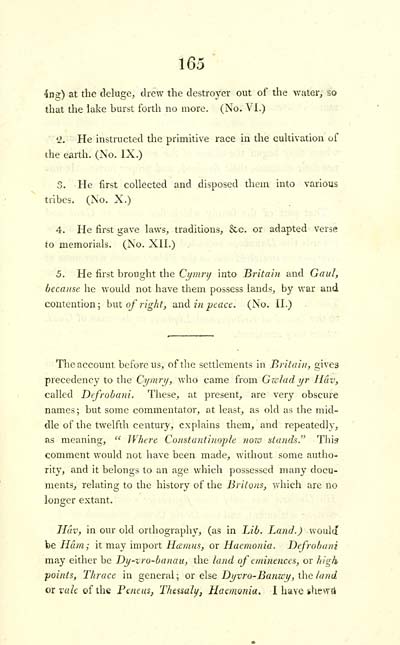Blair Collection > Celtic researches, on the origin, traditions & language, of the ancient Britons
(255)
Download files
Complete book:
Individual page:
Thumbnail gallery: Grid view | List view

165
íng) at the deluge^, tlrew the destroyer out of the water, so
that the lake burst forth no more. (No. Vl.)
*i. He instructed the primitive race in the cukivation of
the earth. (No. IX.)
3. He first collected and disposed them into various
tribes. (No. X.)
4. He first gave laws, traditions, &c. or adapted verse
to memorials. (No. ΧΠ.)
5. He first brought the Cymrij into Britain and Gaul,
because he would not have them possess lands, by war and
contention; hut of right, ana iti peace. (No. H.)
The account before us, of the settlements in Britain, gives
precedency to the Cymry, who came from Gzclad yr Hav,
called Defrobani. These, at present, are very obscure
names ; but some commentator, at least, as old as the mid-
dle of the tAvelfth century, explains them, and repeatedly,
as meaning, " Where Constantinople now stands." This
comment \vould not have been made, without some autho-
rity, and it belongs to an age which possessed many docu-
ments, relating to the history of the Britons, vrhich are no
longer extant.
Huv, in our old orthography, (as in Lib. Land.) would
be Ham; it may import Hcsmus, or Haemonia. Defrobani
may either be Dy-vro-banau, the land of eminences, or high
points, Thrace in general; or else Dyvro-Bamci/, the land
orvfl/eofthe Pe/ieus, Thessali/, Haemonia, I have shewà
íng) at the deluge^, tlrew the destroyer out of the water, so
that the lake burst forth no more. (No. Vl.)
*i. He instructed the primitive race in the cukivation of
the earth. (No. IX.)
3. He first collected and disposed them into various
tribes. (No. X.)
4. He first gave laws, traditions, &c. or adapted verse
to memorials. (No. ΧΠ.)
5. He first brought the Cymrij into Britain and Gaul,
because he would not have them possess lands, by war and
contention; hut of right, ana iti peace. (No. H.)
The account before us, of the settlements in Britain, gives
precedency to the Cymry, who came from Gzclad yr Hav,
called Defrobani. These, at present, are very obscure
names ; but some commentator, at least, as old as the mid-
dle of the tAvelfth century, explains them, and repeatedly,
as meaning, " Where Constantinople now stands." This
comment \vould not have been made, without some autho-
rity, and it belongs to an age which possessed many docu-
ments, relating to the history of the Britons, vrhich are no
longer extant.
Huv, in our old orthography, (as in Lib. Land.) would
be Ham; it may import Hcsmus, or Haemonia. Defrobani
may either be Dy-vro-banau, the land of eminences, or high
points, Thrace in general; or else Dyvro-Bamci/, the land
orvfl/eofthe Pe/ieus, Thessali/, Haemonia, I have shewà
Set display mode to: Large image | Transcription
Images and transcriptions on this page, including medium image downloads, may be used under the Creative Commons Attribution 4.0 International Licence unless otherwise stated. ![]()
| Early Gaelic Book Collections > Blair Collection > Celtic researches, on the origin, traditions & language, of the ancient Britons > (255) |
|---|
| Permanent URL | https://digital.nls.uk/75766700 |
|---|
| Description | A selection of books from a collection of more than 500 titles, mostly on religious and literary topics. Also includes some material dealing with other Celtic languages and societies. Collection created towards the end of the 19th century by Lady Evelyn Stewart Murray. |
|---|
| Description | Selected items from five 'Special and Named Printed Collections'. Includes books in Gaelic and other Celtic languages, works about the Gaels, their languages, literature, culture and history. |
|---|

